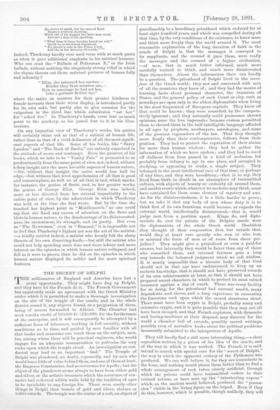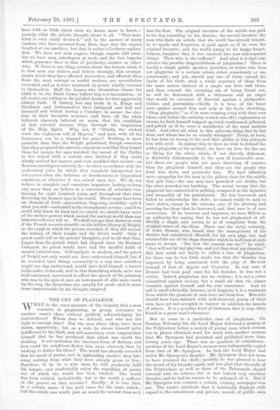THE SECRET OF DELPHI.
THE millionaires of England and America have lost a great opportunity. They might have dug up Delphi, and they have let the French do it. The French Government has apparently made an agreement with the Greek Ministry under which it is permitted to make a thorough investigation on the site of the temple of the oracle, and in the whole district round it, any objects found, or a proportion of them, being of course forwarded to Athens. The Chamber last week voted a credit of 500,000 fr. (220,000) for the furtherance of the enterprise, and it will consequently be attempted by a sufficient force of labourers, working in full security, without conditions as to time, and guided by men familiar with all that books and museums can teach them on the subject, men, too, among whom there will be practical engineers, who would engage for an adequate remuneration to pulverise the very rocks upon which the temple stood. An investigation so con- ducted may lead to an important "find." The Temple of Delphi was plundered, no doubt, repeatedly, and by men who would leave little of value behind them, and one of them at least, the Emperor Constantine, had no reverence for Apollo ; but the object of the plunderers seems always to have been either gold and silver, or the artistic treasures which the reverence of cen- turies had collected within walls held by the tradition of ages to be inviolable to any foreign foe. There were surely other things in Delphi than vessels of gold and silver, statues or votive swords. The temple was the centre of a cult, an object of guardianship to a hereditary priesthood which endured for at least eight hundred years, and which was compelled during all that time, by the very conditions of its existence, to know more and think more deeply than the world around it. The most reasonable explanation of the long duration of faith in the oracle of Delphi is, that the messages it conveyed to its suppliants, and the counsel it gave them, were really the messages and the counsel of a higher civilisation, —of men, that is, much better informed, much more carefully trained to think, and much more disinterested than themselves. About the information there can hardly be a question. The priesthood of Delphi lived in the earre- four of the Greek World; they saw and conversed with men of all the countries they knew of ; and they bad the means of learning facts about personal character, the resources of States, and the general policy of each Court or city, such as nowadays are open only to the ablest diplomatists when living in the most frequented of European capitals. They knew all that could be known ; they were consulted by the compara- tively ignorant ; and they naturally could pronounce shrewd opinions, none the less impressive because custom permitted them to shroud them in the half-intelligible language affected in all ages by prophets, soothsayers, astrologers, and some of the greatest expounders of the law. That they thought more deeply than their contemporaries, follows from their position. They had to protect the reputation of their shrine for more than human wisdom ; they had to gather the information of which we have spoken ; and they had to ward off dullness from lives passed in a kind of seclusion, led probably from infancy to age in one place, and occupied in studying, or appearing to study, a single subject. They belonged to the most intellectual race of that time, or perhaps of any time, and they were hereditary,—that is to say, they lived from birth to death in an atmosphere of transmitted culture, with objects of beauty or curiosity all around them, and amidst events which, whatever we moderns may think, must have contained for them some element of mystery and awe. As for the disinterestedness, it is a little harder to prove ; but we take it that any body of men whose duty it is to think first of its own functions, would become, as regards the external world, intellectually disinterested,—that is, would judge men from a position apart. Kings do, and diplo- matists do, and the priests of the Delphic oracle were the diplomatists of the whole Greek world. Doubtless they thought of their corporation first, but outside that, would they at heart care greatly who won or who lost, or misread the force of men or of races from sheer pre- judice P They might give a prejudiced or even a paid-for answer, but internally they would be fairer than any of those who consulted them, and internal fairness goes a long way towards the balanced judgment which we call wisdom. It is nearly impossible that a hieratic body of that kind should not in that age have endeavoured to keep up an esoteric knowledge, that it should not have preserved records of its own achievements at least, or that it should not have prepared secret chambers in which to protect its most valued treasures against a day of wrath. There was every facility for so doing, for the priesthood had unusual wealth, many dependents and slaves, and a long experience in excavating the limestone nack upon which the sacred structures stood. There must have been crypts in Delphi, probably many and extensive crypts, and it is quite possible that they may not all have been ravaged, and that French explorers, with dynamite and boring-machines at their disposal, may discover for the world a chamber full of records, possibly sacred writings, possibly even of narrative books about the political problems incessantly submitted to the interpreters of Apollo.
They will hardly find a still more interesting thing,—a clear exposition written by a priest of his idea of the oracle, and of the way in which it was worked. The French, it is said, intend to search with special care for the " secret of Delphi," the way in which the apparent ecstasy of the Pythoness was produced. We can well believe it, for they are iconoclasts in the bone, and nothing would please them better than to find a whole arrangement of rock tubes clearly artificial, through which the priests could have transmitted orders to their trained actress, or have sent up the "intoxicating vapour" which, as the ancient world believed, produced the "posses- sion" visible in the living figure on the tripod. Even if they do this, however, which is possible, though unlikely, they will have told us little about what we desire most to know,— namely, what the priests thought about it all. "That man- kind is very easily deceived," will be the answer of many readers, who have assumed froni Eton days that the augurs laughed at one another; but that is rather a Cockney explana- tion. We have not seen augurs, though augurs still exist; but we have seen astrologers at work, and the last impulse which possesses them is that of jocularity, sinister or other- wise. If there is one thing certain about the human mind, it is that men can believe, and believe strongly, that arrange- ments which they have effected themselves, and effected often from the most corrupt or sordid motives, are nevertheless overruled, and as it were mastered, by power wholly external to themselves. Half the Lamas who themselves choose the -child to be the Dalai Lama, believe him a reinearnation,—at all events, are willing to die painful deaths for that apparently absurd faith. If history has any truth in it, Kings and Cardinals and Ambassadors have intrigued and lied and menaced and bribed during a Conclave to secure the elec- tion of their favourite nominee, and have all the while believed, sincerely believed we mean, that the candidate at last selected became Pope through the inspiration of the Holy Spirit. Why not, if "blindly the wicked work the righteous will of Heaven," and man, with all his basenesses, can be a channel for grace P Nothing is more earobable than that the Delphi priesthood, though conscious that they prepared the answers, conscious even that they forged them for money, for ages watched the ascent of the Pythia to her tripod with a certain awe, doubted if they could wholly control her answer, and even modified that answer—as Eastern astrologers certainly do—in strict accordance with the anderstood rules by which they regularly interpreted her utterances when the delirium or drunkenness or hypnotised .condition, or whatever it was, seized upon her. We do not believe in complete and conscious imposture lasting so long, any more than we believe in a succession of actresses con- tinuing for eight hundred years, and throughout that time deceiving the keenest eyes in the world. There must have been an element of faith, superstition, lingering credulity—call it what you will—embedded in the hierophants' service ; and if we .could only know its kind and its extent, we should know more of the motive-powers which moved the ancient world than any histories will ever tell us. We shall not get that, however, even if the French savants stumble on the hidden library of Delphi, or the crypt in which the priests recorded, if they did record, the history of their temple and the Greek world. Only a priest could tell us the priests' thoughts; and in all that time, longer than the period which ha's elapsed since the Norman Conquest, no priest would have had the needful habit of mental introversion. Self-analysis is modern, and. the priest of Delphi not only would not have understood himself, but if he recorded such things accurately in a way that outsiders might one day understand, would have held himself a traitor to his order, to his salt, and to that Something which, as he was half-convinced, intervened to affect the speech of the priestess who was in his eyes at once an instrument of able men—used, by-the-way, the historians say, ueually for good—and in some *sense impenetrable by his thought, inspired.







































 Previous page
Previous page